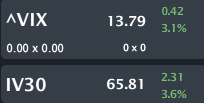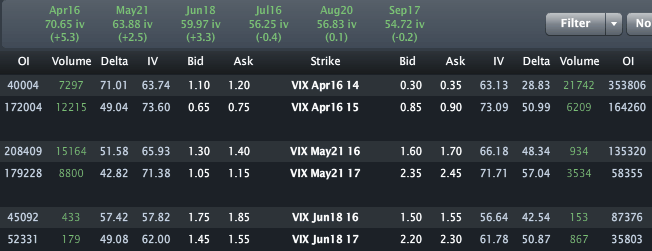| Tweet |  |  |
VIX is quoting $13.79, up 3.1% with IV30™ up 3.6%. The Symbol Summary is included below.

Provided by Livevol
Yesterday (Thursday Apr 3) I wrote this article:
VIX - Has the Market Fallen Asleep or Is There Really This Little Risk Right Now?
But here's a question that should be answered... What the hell is the VIX?
And while we're at it, what are VIX futures, and how does no arbitrage pricing come into play when we're dealing with the derivative of a derivative of a derivative of a derivative?
The CBOE Volatility Index - more commonly referred to as "VIX" - is an up-to-the-minute market estimate of expected volatility that is calculated by using real-time S&P 500® Index (SPX) option bid/ask quotes. VIX uses nearby and second nearby options with at least 8 days left to expiration and then weights them to yield a constant, 30-day measure of the expected volatility of the S&P 500 Index. When the near-term options have less than a week to expiration, VIX “rolls” to the second and third SPX contract months.
OK, well, that's nice, but here's how it works... in English.
Main Items:
- S&P 500 Index
- S&P 500 Index Options (a derivative)
- VIX Spot Price aka VIX Index (a derivative)
- VIX Futures (a derivative)
- VIX Options (a derivative)
Calculating VIX Spot (aka VIX Index)
Let's do some math so we can calculate the VIX on our own (very back of the envelope).
Today: 4-4-2014
First Expiry: 4-19-2014
Next Expiry: 5-17-2014
VIX is a rolling 30-day weighted average, so first we need our weights:
4-19-2014: 15 days from expiration
Conveniently, that's exactly half the 30-day period, so we know the weights are (about) 50% First Expiry and 50% Second Expiry.
So if we take the vols for the strikes near the money in SPX for the front two months and weight the months 50/50, we should get VIX (ish).
Why is it Called the "Fear Index"
When the market moves down, volatility tends to rise (for stocks and indices). As volatility rises, the VIX rises (it's literally a measure of the implied volatility in the SPX options).
To read more about volatility skew, what is and why it exists you can click the title below:
Understanding Option Skew -- What it is and Why it Exists.
But of course, you can't trade the VIX spot (VIX index), it's just a quoted percentage. So what can you trade?
Calculating VIX Futures
"VIX futures have been offered on the CBOE Futures Exchange since 2004. The underlying value for the futures is based off the VIX index."
Source: CBOE
VIX futures trade with various expiries as well. Here's a snapshot of the quotes right now for just the front three months:

Provided by BarChart
Note that all of the future prices of VIX are higher than the spot price of 13.79%. In fact, the Dec VIX futures price in a VIX of over 18%. So why can't I buy the VIX today for 13.79% and immediately sell the VIX in the future @ 18%.
Again, the VIX spot is not tradable.
Here's another secret, and it comes down to the fundamental theorem of finance:
We don't need the VIX futures quotes to know the price of the futures. Nope, we can get it straight from the option market -- the VIX option market. Here's how:
The VIX Options Tab is included below:

Provided by Livevol
By using the at-the-money (ATM) synthetic spot, we can back out the futures value just like we can use options to create synthetic long and short stock.
VIX future value = Calls + Strike - Puts (assuming interest = 0%)

Provided by Livevol
Well there you go... Who needs a futures quote when you have VIX options, right?
Why does this work?
This isn't a weird coincidence, it's actually based on the fundamental theorem of finance (also called no arbitrage pricing).
Fundamental Theorem of Finance
The fundamental theorems of arbitrage/finance provide necessary and sufficient conditions for a market to be arbitrage free and for a market to be complete.
Source: Wikipedia
What Does that mean? Try this on for size:
If one could buy (sell) the VIX future value via options at a price lower (higher) than the futures price, then the rationale actor would buy the cheap future value (via the options) sell the expensive future value (via the futures) and reap a risk free profit (aka arbitrage). So it's a tautology that the option implied value and the futures prices are identical by expiry. Now you can start to get a feel for how intertwined the derivatives markets are.
And for the record VIX Options are:
A derivative (options are a derivative of the VIX futures) --
On a derivative (VIX futures prices are derivatives of the VIX) --
On a derivative (VIX is a derivative of SPX options) --
On a derivative (SPX options are a derivative of SPX).
And... all of these markets must satisfy no arbitrage pricing.
Now, how closely does each tick of the VIX get followed? Really fricking closely. There are multiple markets that arb traders are following (algorithmically) ready to scalp even the slightest bit of edge.
"VIX" on Individual Stocks
A 30-day implied volatility index on every stock that has options trading on it is available through Livevol. And no, I don't work for Livevol right now (I did, though). Yep, every single stock has an IV30™, which is basically a VIX on the stock. It's that number that I follow when I post my volatility notes, like the prior 5,000 blogs I have posted.
Remember, option trading is volatility trading, whether you mean it to be or not.
This is trade analysis, not a recommendation.
Follow @OphirGottlieb
Tweet
Legal Stuff:
Options involve risk. Prior to buying or selling an option, an investor must receive a copy of Characteristics and Risks of Standardized Options. Investors need a broker to trade options, and must meet suitability requirements.
The information contained on this site is provided for general informational purposes, as a convenience to the readers. The materials are not a substitute for obtaining professional advice from a qualified person, firm or corporation. Consult the appropriate professional advisor for more complete and current information. I am not engaged in rendering any legal or professional services by placing these general informational materials on this website.
I specifically disclaim any liability, whether based in contract, tort, strict liability or otherwise, for any direct, indirect, incidental, consequential, or special damages arising out of or in any way connected with access to or use of the site, even if I have been advised of the possibility of such damages, including liability in connection with mistakes or omissions in, or delays in transmission of, information to or from the user, interruptions in telecommunications connections to the site or viruses.
I make no representations or warranties about the accuracy or completeness of the information contained on this website. Any links provided to other server sites are offered as a matter of convenience and in no way are meant to imply that I endorse, sponsor, promote or am affiliated with the owners of or participants in those sites, or endorse any information contained on those sites, unless expressly stated.



I appreciate you writing this, but I assume you wrote it for a newbie who knows nothing, yet it seems to assume some things that a newbie and semi-newbie like me has no idea about.
ReplyDeleteWhat is arbitrage? It sounds like a daytime soap opera on CNBC :) You may allude to this meaning "profit without risk" but I don't understand that concept at all. Do not all profit seeking actions involve risk? Even pure profit thru theft involves risk (unless you are Goldman Sachs). I must not be smart enough to understand the example. When I re-read it again, it may appear that you are saying there can not be any arbitrage (i.e. all profit involves risk, therefore there cannot be any profit without risk), but then at the end it appears you might be saying a person could buy the implied future value for 10 cents less than the actual value, and profit that way? Does arbitrage have anything to do with arbitration (non-jury trial etc) or am I way off?
I guess I need it explained to me like I'm 5 years old :)
Next, what is volatility? If I search for a definition, I find wonderfully confusing phrases. So far all I can surmise is that it means it is more likely to change state from a liquid to a gas, so that must mean you might be at risk of having your money evaporate?
I guess in retrospect it means a previous probability of certainty has changed, to where it is not likely to be as certain anymore. Which is still very confusing.
Let's try an example: if a stock price has held steady in the range of $1.00 to $1.05 for 3 years, you would say it is pretty stable and your are pretty certain that it will not change from that price range. Therefore, you wouldn't need to buy insurance in the form of an option contract, because you wouldn't be worried that the price would go up or down based on it's historical evidence. So you buy 1 million shares.
Next week it is announced that the CEO is stepping down and putting his son-in-law in charge of the company, whom everyone has the opinion he is a complete idiot. Now there is a risk that the stock price will fall as the company falls apart due to the new idiot CEO. So now you have a reason to buy insurance, and an option contract becomes valuable to you, and someone else would want to sell one to you so they might earn some profit from your fear. Does that make "more" sense as a plain jane way to explain the concept of risk, an increase in volatility, and the need for options to either protect or as a possibility to profit from other people's need for security in the face of uncertainty (ie volatility)?
And can we please use the abbreviation vola to mean volatility, and volu to mean volume? Using vol makes it confusing as to which work it refers to, and requires us to go back and re-read the passage to get the proper usage, and after a while I think we will just give up and go watch Netflix :)
Perhaps this will help your understanding of volatility: http://optionvol.blogspot.com/2012/01/understanding-option-skew-what-it-is.html
DeleteThanks for your note, SBL.
Options are not insurance. They may be used as insurance, but an option is a leveraged stock position with an explicit expiration date and exercise price.
Further, the fundamental theorem of finance (no arbitrage) is the backbone of all investing. Try to look it up in various sources and see if one version makes more sense than another, if it doesn't quite make sense to you, I don't think investing your own funds in any risky asset(stocks, bonds, real-estate, commodity, currencies, etc.) is a wise move without an advisor.
The main point is simply this: If a basket of assets (or one asset) has the same payoff as another basket of assets (or one asset), then the prices of the two baskets (or single assets) must be equal.